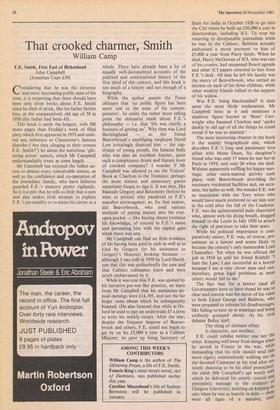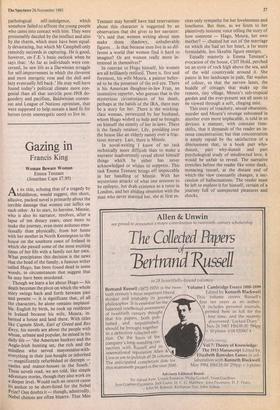That crooked charmer, Smith
William Camp
F.E. Smith, First Earl of Birkenhead John Campbell (Jonathan Cape £30)
considering that he was the cleverest and most fascinating public man of his time, it is surprising that there should have been only three books about F.E. Smith since he died of drink, like his father before him, at the comparatively old age of 58 in 1930 (his father had been 43).
This book is easily the longest, with 300 more pages than Freddie's work of filial piety which first appeared in 1935 and omit- ted any reference to Chesterton's famous diatribe (`Are they clinging to their crosses F.E. Smith?') let alone the notorious `glit- tering prizes' speech, which Mr Campbell understandably treats at some length.
Mr Campbell has enjoyed the fullest ac- cess to almost every conceivable source, as well as the confidence and co-operation of the immediate family, who have hitherto guarded F.E.'s memory pretty vigilantly. So it is a pity that he tells us little that is new and also makes little attempt to explore F.E.'s personality or to assess his career as a whole. There have already been a lot of equally well-documented accounts of the political and constitutional history of the first third of this century, and this book is too much of a history and not enough of a biography.
While the author quotes the Times obituary that `no public figure has been more real to the mass of his contem- poraries', he omits the rather more telling point the obituarist made about F.E.'s philosophy — i.e. that 'life was chiefly a business of getting on'. Why then was Lord Burstinghead — as his friend Beaverbrook's unobliging employee David Low irritatingly depicted him — the cap- tivator of young people, the famous bully who was also an excellent listener, quite such a conspicuous drunk and blatant lover of crooked company? I wonder if Mr Campbell was allowed to see the Visitors' Book at Charlton in the Twenties; perhaps the more sinister and unsavoury guests sometimes forgot to sign it. It was they, like Maundy Gregory and Bottomley (before he went to prison) who pandered to F.E's macabre extravagance; as, for that matter, did Beaverbrook, who used various methods of paying money into his ever- open pocket — like buying shares (without his knowledge, of course) in F.E.'s name and presenting him with the capital gain when there was any.
Mr Campbell can find no firm evidence of his having been paid in cash as well as in kind by Gregory for his assistance to Gregory's Honours broking business — although I was told in 1959 by Lord David- son that this was undoubtedly the case and that Cabinet colleagues knew and were much embarrassed by it.
While it was true that F.E. was spoiled by his lucrative pre-war Bar practice, we learn from Mr Campbell that his maximum an- nual earnings were £14,195, and not the far larger sums about which he subsequently boasted. (He also boasted that while at Ox- ford he used to pay an understudy £5 a term to write his weekly essay). After the war, despite the frequent largesse of Beaver- brook and others, F.E. could not begin to get by on his £5,000 a year as a Cabinet Minister; he gave up being Secretary of State for India in October 1928 to go into the City where he built up £30,000 a year in directorships, including ICI. To stop his resorting to disreputable journalism while he was in the Cabinet, Baldwin actually authorised a secret payment to him of £5,000 a year from Party funds. When he died, Harry McGowan of ICI, who was one of his cronies, had unopened Board agenda and other ICI papers returned to him from F.E.'s desk. All that he left his family was the mercy of Beaverbrook, who settled an income on each of his three children, while other wealthy friends rallied to the support of his widow.
Was F.E. being blackmailed? It does seem the most likely explanation. Mr Campbell hints at it and mentions a shadowy figure known as 'Buns' Cart- wright who haunted Charlton and 'spoke darkly in old age of all the things he could reveal if he was so minded.'
The most interesting chapter in the book is the mainly biographical one, which describes F.E.'s long and passionate love affair with Mona Dunn, his daughter's friend who was only 17 when he met her in Paris in 1919, and only 26 when she died. Without apparently ruffling his happy mar- riage, other extra-marital activity took place, with Beaverbrook providing the necessary residential facilities and, on occa- sion, the ladies as well. No wonder F.E. was so unpopular with the Tory wives who would have much preferred to see him stay in the cold after the fall of the Coalition. F.E. was the quintessential male chauvinist who, almost with his dying breath, dragged himself to the Lords in July 1930 to attack the right of peeresses to take their seats.
While his political importance is com- paratively minor, F.E. was, of course, pre- eminent as a lawyer and seems likely to become the century's only memorable Lord Chancellor. Yet when he was offered the job in 1918 he told his friend Riddell: hate the Law; I am successful as a lawyer because I am a very clever man and can, therefore, grasp legal problems as most others would fail to do.'
The fact that for a lawyer (and all Governments have to have them) he was so clear and concise was the secret of his value to both Lloyd George and Baldwin, who were prepared to tolerate his disadvantages, like failing to turn up at meetings and being endlessly gossiped about. As his rival debater Belloc said:
The thing of ultimate effect Is character, not intellect.
F.E. could subdue neither one nor the other. Keeping well away from danger when he served in France in the war, while demanding that his wife should send him more cigars; ostentatiously walking out on the doomed Casement at his trial after un- wisely choosing to be his chief prosecutor, the relish (Mr Campbell's apt word) with which he delivered his utterly cynical and pessimistic message to the students of Glasgow University; insisting on keeping six cars when he was so heavily in debt — these were all signs of a massive, truly
pathological self-indulgence, which somehow failed to affront the young people who came into contact with him. They were presumably dazzled by the intellect and also by the charm, which must have been equal- ly devastating, but which Mr Campbell only remotely succeeds in capturing. He is good, however, on F.E.'s basic outlook when he says that: 'As far as individuals were con- cerned, he saw life as a Darwinian struggle for self-improvement in which the cleverest and most energetic rose and the dull and lazy eventually fell back.' He may well have found today's political climate more con- genial than all that unvirile post-1918 do- goodery and pacifism, Baldwinian consen- sus and League of Nations optimism, that were supposed to help sustain a land fit for heroes (even unenergetic ones) to live in.















































 Previous page
Previous page